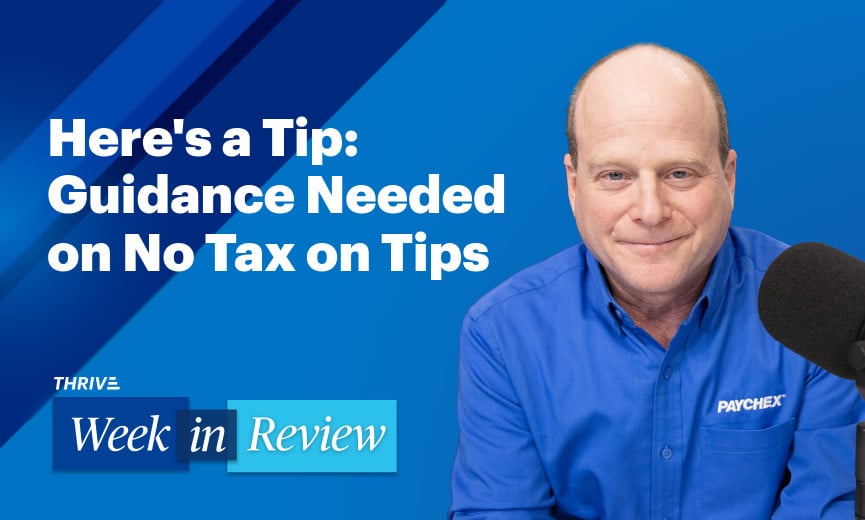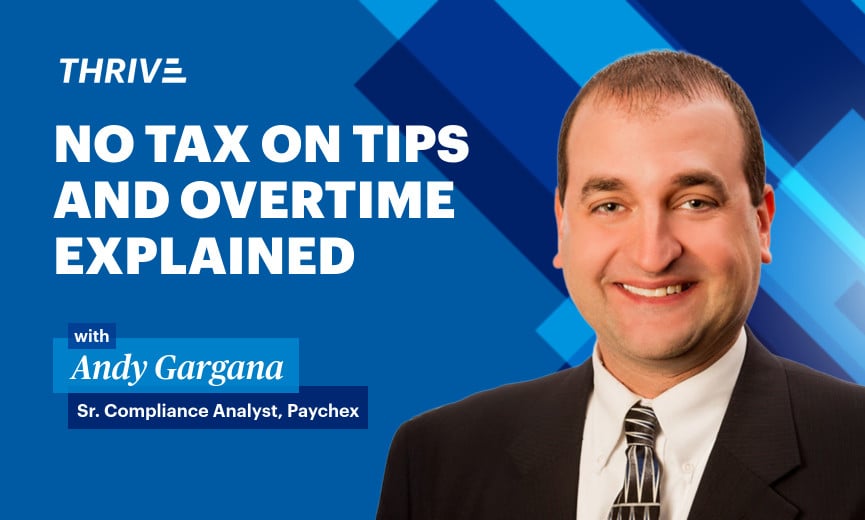- Thrive
-
Season
4Episode89
IRS Pauses Review of ERTC Claims, Entrepreneurship Trendy, Health Care Costs to Soar

Podcast •

Summary
If you’ve filed a claim for the employee retention tax credit after Sept. 13, 2023, expect a delay. The IRS has placed a pause on reviewing new claims until the new year. Gene Marks says the big picture rules won’t change but this will help the IRS weed out the fraudulent claims. On a good note, 1 in 5 adults have started businesses in the past three years as a report shows entrepreneurship on the rise, much like health care costs for employers. Gene shares his insights on how businesses can approach both topics on this week’s podcast.
View Transcript
[Gene Marks, host]
Hey, everybody, it's Gene Marks and welcome to another episode of the Paychex podcast Week in Review, a THRIVE Podcast. This is the podcast where we take a few items from the news from the week before and talk about how they impact your business. So, let's get right to it, shall we?
The first item comes from Kiplinger.com Kiplinger is a tax and research publication and service that I subscribe to and like very much. Kiplinger is reporting that the IRS announced this past week that they are going to be suspending — they will not process — new claims for the employee retention tax credit for the foreseeable future.
It was an immediate moratorium on new ERC claims. It was announced on this past Thursday by the IRS commissioner, and it was in response to concerns raised by tax professionals, the media, and the agency about scams surrounding this pandemic-era tax credit.
Here's what he said. He said The IRS is increasingly alarmed about honest small-business owners being scammed by unscrupulous actors, and we could no longer tolerate growing evidence of questionable claims pouring in. Wow! He also said that the further we get from the pandemic, the further we see the good intentions of this program abused.
So, what does this mean for your business? Well, if you've applied for the employee retention tax credit, you've got to wait a little bit more. I mean, they literally say they're not going to be processing these claims for the foreseeable future. Now, that doesn't mean it's a permanent thing. I mean, they're going to get back to processing, and I think internally, the IRS is looking at it to see what's good and what's bad. And I think they're going to making some judgments and maybe some changes to the rules as to who is eligible for this processing.
I don't think it's going to change the big-picture rules, which is whether or not you were impacted by the pandemic, whether or not you are partially or fully shut down, or if your revenues declined during certain quarters in 2020 or 2021. But the IRS is going to be scrutinizing a lot of the claims for the employee retention tax credit.
So, if you've already submitted a claim for this, you're going to have to wait longer to get your money back from the IRS. So, if you're waiting for it and depending on it, you better prepare for that.
Secondly, if you haven't submitted a claim, you can still do so — obviously, make sure that it's appropriate. Make sure that you're working with a good reputable accountant or payroll service like Paychex, for example. But just know that when you submit this claim, there is a good chance that you're going have to wait a little bit longer for it, as well.
How long? No one is specifying how long this is going to be, but I expect this to delay things probably three, four or five months is what it's looking like to me. But that's just my opinion. So, the ERTC claims on suspension right now.
The next article comes from The Washington Post. In The Washington Post, they were reporting this past week on a new study called The Global Entrepreneurship Monitor. It's an annual report actually by Babson College, and here's what it found.
It found that Americans are starting and running their own businesses at record rates. It's part of a post-pandemic shift toward entrepreneurship led by women and people of color. It is the highest level of entrepreneurship — nearly one in five adults or 19% — are in the process of founding a business or have done so in the past three and a half years. It's the highest level since the survey began in 1999.
Donna Kelly, who is a professor at Babson College and the report's lead author, says, hey “We're seeing an upward trend in entrepreneurship that's continued through the pandemic, and that's really a great sign. It means businesses are introducing innovation, creating jobs, and contributing to the competitiveness of the United States.”
Globally, the United States has the third highest entrepreneurship rate among 21 high-income economies lagging behind — Ready? The United Arab Emirates and Saudi Arabia, but ahead of Canada and the United Kingdom. Great news for startups and entrepreneurs.
A couple of thoughts. If you're starting up a business before you start something up from scratch, you might want to consider buying a business. There is a large generation of older entrepreneurs, you know that “silver tsunami” that are looking to retire over the next five, three, five, 10 years or so that are operating viable businesses.
So, if you're going to put the time and capital and effort into starting something from scratch, you might want to consider buying something that's existing and then making it your own it. It definitely gives you a head start.
So, looking at buying a business, you can go to sites like bizbuysell.com, or you can talk to business brokers in your area and see if there's any businesses in, you know, in an industry or doing something that you find really interesting. That might save you some time and get you going rather than starting up everything from scratch.
But it is great news that a lot of entrepreneurs are starting their businesses up. And listen, it doesn't surprise me. A lot of people are working from home. They've got this flexible schedules. They've got the ability to get online and set up businesses at a fraction of what it costs. Jeez, when I was starting out back in the 90s. So, it's a good trend. I hope to see it continue.
Here's a bad trend that was reported by the Wall Street Journal last week. Prepare yourself now because health insurance costs are going up. They are climbing at the steepest rates in years, with some projecting the biggest increase in more than a decade will wallop businesses and their workers in 2024.
The costs for employer coverage are expected to surge around 6.5% in 2024. This is according to major benefits consulting firms Mercer and Willis Towers Watson, and again reported in the Wall Street Journal.
Such a boost could add significantly to the price tag for employer plans that already average more than $14,600 a year per employee, driving up health insurance costs that are among the biggest expenses for many American companies and a drain on families’ finances.
Big issue for a lot of us small-business owners as their cost of health insurance gets higher. It really does put a lot of pressure on our overhead and our compensation costs because we have to offer some type of health insurance plan.
So, let me give you just a couple of quick pieces of advice here. Number one, if you already have a high deductible plan, consider getting a health savings account. That way you can, you know, your employees and you can put more money away pretax and use it for some of those unreimbursed deductible expenses. You can then increase your deductibles as part of those plans. So, your employees are paying a little bit more, but they're getting a tax break for doing just that.
Also, consider setting up perhaps a health savings account in your business. You can have this with your existing health plan or in lieu of it. This way you can contribute a fixed amount to your employees health savings — sorry, health reimbursement accounts. Did I say health savings accounts? Health reimbursement accounts are ways you can contribute to that health reimbursement account and your employees get that contribution pretax. You know, they don’t have to pay any taxes on it. You get a deduction for it, and then they can use that money to pay for their health insurance, maybe on the exchanges or at a broker that you recommend.
And finally look into captive insurance programs. They are a form of self-insurance and they have been growing significantly in popularity over the past few years. A captive insurance plan is one where you pool your health insurance costs with maybe a thousand other employers, but then it's managed by somebody that that that buys your health insurance for you. You guys pool absorb the risks but also the rewards in the group, and if it's managed the right way, it can really help to control even reduce your health insurance costs.
Bottom line is health insurance costs are going up and we need to be planning for that.
My name is Gene Marks, and you have been listening to this week's episode of the Paychex THRIVE Week in Review. If you need any help or assistance or would like to suggest a guest for this podcast, please visit us at payx.me/thrivetopics.
Hope you got some good information from this. I'll be back with you next week with a few bits of news that impact your business and some thoughts about navigating your way through that information. Thanks for listening. We'll see you again then. Take care.
This podcast is property of Paychex, Inc. 2022. All rights reserved.

 Apple Podcast
Apple Podcast Spotify
Spotify iHeartRadio
iHeartRadio








